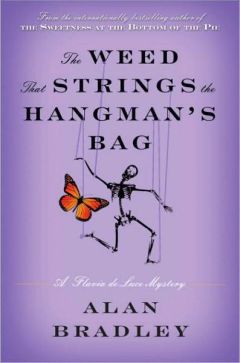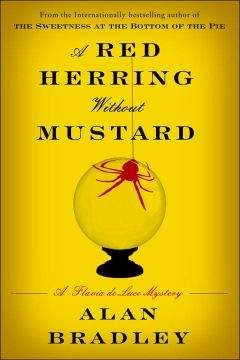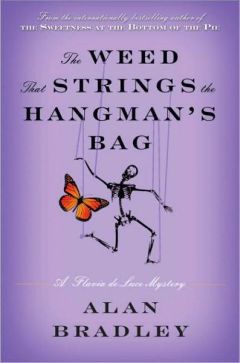Alan Bradley - The Weed That Strings the Hangmans Bag

Скачивание начинается... Если скачивание не началось автоматически, пожалуйста нажмите на эту ссылку.
Жалоба
Напишите нам, и мы в срочном порядке примем меры.
Описание книги "The Weed That Strings the Hangmans Bag"
Описание и краткое содержание "The Weed That Strings the Hangmans Bag" читать бесплатно онлайн.
God blind me with a fish fork! Aunt Felicity's train was due to arrive at five past ten and I'd completely forgotten about her! Father would have my guts for garters.
Even if Aunt Felicity wasn't already fuming on the platform and frothing at the mouth, how on earth was I ever going to get to Doddingsley? It was a good six miles from Culverhouse Farm, even as the crow flies, and as far as I knew, I wasn't about to sprout wings.
Down the lane I ran, windmilling my arms as if that could propel me to a greater speed. Fortunately, it was downhill all the way, and at the bottom, I could see Rupert's van parked beneath the willows.
Dieter had the Austin's hood open and was poking around in its innards. Nialla was hanging a shirt on the bushes to dry. Gordon Ingleby was nowhere in sight, nor was Sally Straw.
"First chance I've had to break out the old Sunlight," Nialla told me. "Dieter's having a peek at the motor. Whatever took you so long?"
"What time is it?" I pleaded.
"Search me," she replied. "Rupert's the only one who owns a watch, and he's taken himself off somewhere."
As he always does. She did not actually speak the words, but her meaning was as clear as if she'd shouted them from the top of Big Ben.
"Dieter?" I asked.
Dieter shook his head. "Sorry. It was for such a long time forbidden to possess one...."
"Excuse me," I interrupted, "but I have to meet a train."
Before they could answer, I was off along the towpath at top speed. It was an easy run along the old embankment, which skirted the southern edge of Jubilee Field, and within surprisingly few minutes, I was leaping across the stepping-stones to the churchyard.
The clock on the church tower showed twenty minutes to four, which was impossible: The stupid thing had probably stopped in the reign of Henry the Eighth and nobody had cared enough to set it going again.
Gladys, my trusty BSA, was exactly where I had left her at the side of the parish hall. I pushed off for Buckshaw.
As I raced past the corner of Spindle Lane, the clock set into the wall of the Thirteen Drakes showed that the time was either noon or midnight. I'm afraid I let slip rather a rude word.
Out of the village I went like the wind, south west-wards towards Buckshaw, until I came at last to the Mulford Gates, where Clarence Mundy sat waiting, perched on one of the wings of his taxicab, dragging thirstily at a cigarette. By the snowfall of butts on the road, I could tell that it was not his first.
"Hullo, Clarence," I said. "How's the time?"
"Ten hundred hours," he said, glancing at his elaborate military wristwatch. "Better climb aboard."
He let in the clutch as I did so, and we were off like a skyrocket.
As we tore along through lanes and hedgerows, Clarence worked the gear stick like a snake charmer grappling with a wilful cobra, seizing its head every few seconds and shoving it to some new quarter of the compass. Outside the windows, the countryside streamed past in an ever-accelerating blur of green, until I wanted to scream "Yarooh!" — but I restrained myself.
During the war, Clarence had flown the jumbo-sized Sunderland flying boats, endlessly patrolling the vast Atlantic for German U-boats, and, as we fairly flew along between the pressing hedgerows, he seemed still to imagine himself at the controls of one of these behemoths. At any moment, I thought, he would pull back on the steering wheel and we would lift off into the air. Perhaps, during our ascent into the summer sky, we might even catch a glimpse of Harriet.
Before she had married Father, Harriet had piloted her own de Havilland Gipsy Moth, which she had named Blithe Spirit, and I sometimes imagined her floating alone up there in the sunshine, dipping in and out of the puffy valleys of cumulus, with no one to answer to except the wind.
Clarence skidded to a stop at one end of the Doddingsley railway platform as the train steamed in at the other.
"Ten-oh-five," he said, glancing at wristwatch. "On the dot."
As I knew she would be, the first passenger to step down from the carriage was Aunt Felicity. In spite of the heat, she was wearing a long, light-colored motoring coat and a great solar topee, which was tied under her chin with a broad blue ribbon. Various bits protruded from her person in all directions: hatpins, umbrella handles, rolled-up magazines, newspapers, shooting sticks, and so forth. She looked like a walking bird's nest, or, rather, more like an ambulatory haystack.
"Fetch my luggage, Clarence," she said, "and mind the alligator."
"Alligator?" Clarence said, his eyebrows shooting up.
"The bag," said Aunt Felicity. "It's new from Harrods, and I won't have it ruined by a clumsy rustic on some godforsaken railway platform.
"Flavia," she said, "you may carry my hot-water bottle."
* EIGHT *
DOGGER MET US AT the front door. He fished a cloth change purse from his pocket and raised his eyebrows at Clarence.
"Two bob," Clarence said, "going and coming — including the wait."
As Dogger counted out the coins, Aunt Felicity leaned back and ran her eyes over the facade of the house.
"Shocking," she said. "The place grows shabbier before one's very eyes."
I did not feel it my place to tell her that, when it came to expenses, Father was nearly at his wit's end. The house had actually belonged to Harriet, who had died young, unexpectedly, and without troubling to make a will. Now, because of what Father called "complications," it seemed unlikely that we would be able to remain at Buckshaw for much longer.
"Take my bags to my room, Dogger," Aunt Felicity said, returning her gaze to earth, "and mind the alligator."
"Yes, Miss Felicity," Dogger said, a wicker hamper already under each arm and a suitcase in each hand. "Harrods, I believe."
"Aunt Felicity's arrived," I said, slouching into the kitchen. "I'm suddenly not very hungry. I think I'll just have a lettuce sandwich and eat it in my room."
"You'll do no such thing," Mrs. Mullet said. "I've gone and made a nice aspic salad, with beets and that."
I pulled a horrid face, but when she glanced at me unexpectedly, I remembered Nialla's dodge and cleverly transformed my grimace into a yawn, covering my mouth with my hand.
"Sorry. I was up early this morning," I said.
"So was I. More's the pity."
"I was at Ingleby's farm," I volunteered.
"So I heard," she said.
Petrify the woman! Was there nothing that escaped her ears?
"Mrs. Richardson told me you was helpin' them puppet people, her with her Judas hair, like, and him with his gampy leg."
Cynthia Richardson. I should have guessed. Obviously, the presence of the puppeteers had loosened the purse-string mouth.
"Her name's Nialla," I said, "and his is Rupert. She's quite a nice person, actually. She makes scrapbooks — or she used to, at least."
"That's all very well, I'm sure, dear, but you'll have to — "
"I met Mrs. Ingleby, too," I persisted. "In fact, we had quite an interesting chat."
Mrs. Mullet's polishing of the salad plates slowed — and stopped. She had taken the bait.
"A chat? Her? Ha! That'll be the thirsty Friday!
"Poor soul," she added, as a quick afterthought.
"She talked about Robin, her son," I said, with a crumb of truth.
"Get away with you!"
"She said that Robin's gone."
This was too much even for Mrs. Mullet.
"Gone? I should say he is. He's deader than a doorknob these five years or more. Dead and buried. I mind the day they found him, hangin' by 'is neck in Gibbet Wood. It was a washday Monday, and I'd just hung a load on the line when Tom Batts the postman come to the gate. 'Mrs. M,' he says to me, he says, 'you'd best get ready to hear some bad news.' 'It's my Alf!' I says, and he says, 'No, it's young Robin, Gordon Ingleby's boy,' and phoosh! The wind went out of me just like that. I thought I was going to — "
"Who found him?" I interrupted. "Young Robin, I mean."
"Why, Mad Meg it was. Her as lives up there in Gibbet Wood. She spotted a bit of bright under a tree — that's what she calls any old bit of 'mongery she comes across: 'a bit of bright' — and when she goes to pick it up, she sees it's one of them toy shovels, them as you'd take to the beach, like, and the tin sand pail, too, lyin' right there in the woods."
"Robin's mother took him to the seaside," I was about to say, but I stopped myself just in time. I remembered that gossip withheld draws more gossip: "like flies to a magnet," as Mrs. Mullet herself had once remarked about another matter entirely.
"And then she saw 'im, swingin' by the neck from that there old scaffold," she went on. "'Is face was awful, she said — like a blackened melon."
I was beginning to regret that I hadn't brought my notebook.
"Who killed him?" I asked bluntly.
"Ah," she said, "that's the thing. Nobody knows."
"Was he murdered?"
"Might have been, for all that. But like I said, nobody knows for sure. They had what they call an ink-quest at the library — it's the same thing as a poet's mortem, Alf says. Dr. Darby got up and told them the little lad was hanged, and that's all he could rightly say. Mad Meg claimed the Devil took 'im, but you know what she's like. They called up the Inglebys, and that German what drives their tractor — Dieter, 'is name is — as well as Sally Straw. Dumb as Dorothy's donkey, the lot of 'em. Including the police."
The police? Of course!
The police would certainly have investigated Robin Ingleby's death, and if my guess was right, my old friend Inspector Hewitt would have had a hand in it.
Well, the Inspector wasn't exactly an old friend, but I had recently assisted him with an investigation in which he and his colleagues were completely baffled.
Rather than rely on Mrs. Mullet's village hearsay, I'd get the facts straight from the horse's mouth, so to speak. All I needed was an opportunity to bicycle over to the police station in Hinley. I would drop in casually, just in time for tea.
As I cycled past St. Tancred's, I couldn't help wondering how Rupert and Nialla were getting on. Well, I thought, as I braked and circled back, it wouldn't take long to find out.
But the door to the parish hall was locked. I gave it a good old shaking and more than a few hard knocks, but no one came to let me in. Could they still be at Culverhouse Farm?
I pushed Gladys through the churchyard to the riverbank, and lifted her across the stepping-stones. Although it was overgrown in places with weeds, and deeply rutted, the towpath brought me quickly back to Jubilee Field.
Nialla was sitting under a tree, smoking, with Dieter at her side. He scrambled to his feet as soon as he saw me.
"Well, well," she said. "Look what the cat dragged in."
"I thought you'd be at the church."
Nialla twisted the butt of her cigarette fiercely against a tree trunk. "I suppose we should be," she said, "but Rupert hasn't found his way back yet."
This struck me as rather odd, since Rupert presumably didn't know anyone in the neighborhood of Bishop's Lacey. What — or who — could have kept him away so long?
"Perhaps he's gone off to see about the van," I said, noticing that the Austin's hood was now closed and latched.
"More likely he's just gone off to have a good sulk," Nialla said. "He does that, now and again. Sometimes he just wants to be alone for a while. But he's been gone for hours.
"Dieter thought he saw him heading off in that direction," she added, pointing a finger over her shoulder.
I turned, and found myself staring up with renewed interest at Gibbet Wood.
"Flavia," Nialla said, "leave him be."
But it wasn't Rupert I wanted to see.
By keeping to the grassy headlands at the edge of the field, I was able to stay clear of the growing flax as I trudged steadily on upwards. It wasn't much of a climb for me, but for Rupert, with his leg in an iron brace, it must have been torture.
What on earth would possess the man to climb back up to the top of Gibbet Hill? Did he have some notion of flushing Meg from the dense thickets, and demanding that she hand over Nialla's butterfly compact? Or was he in a sulk, threatened by Dieter's blond good looks?
I could think of a dozen more reasons, yet not one of them made perfect sense.
Above me, Gibbet Wood clung to the top of Gibbet Hill like a green skullcap. As I approached, and then entered beneath the branches of this ancient forest, it was like stepping into a painting by Arthur Rackham. Here, in the dim green gloom, the air was sharp with the smell of decay: of funguses and leaf mold, of black humus, of slithering muck, and of bark gnawed away to dust by beetles. Bright cobwebs hung suspended like little portcullises of light between the rotted tree stumps. Beneath the ancient oaks and lichen-coated hornbeams, bluebells peeped out from the deep shadows among the ferns, and there on the far side of the glade I spotted the serrated leaves of the poisonous dog's mercury that, when steeped in water, produced a gorgeous indigo poison that I had once transformed into the bright red color of arterial blood simply by adding a two-percent solution of hydrochloric acid.
I thought with pleasure of how the ammonia and amides given off by the deep compost on the forest floor provided a perfect feast for omnivorous molds that converted it to nitrogen, which they then stored in their protoplasm, where it would be fed upon by bacteria. It seemed to me a perfect world: a world in which cooperation was a fact of life.
I drew in a deep breath, sucking the sour tang into my lungs and savoring the chemical smell of decay.
But this was no time for pleasant reflections. The day was hurrying on, and I had still to find my way to the heart of Gibbet Wood.
The farther I went in among the trees, the more silent it became. Now, even the birds had become eerily still. This wood, Daffy had told me, was once a royal forest in which, many centuries ago, kings of England had hunted the wild boar. Later, the Black Death had taken most of the inhabitants of the little village that had grown up beneath its skirts.
I shivered a bit as, high in the branches above me, the leaves stirred fitfully, though whether it was from the swift passage of the ghostly royal hunters or the restless spirits of the plague victims — surely they were buried somewhere nearby? — I could not tell.
I tripped on a hummock and threw out my arms to save myself. A rotted stump of moss-covered wood was all that stood between the muck and me, and I grabbed at it instinctively.
As I regained my balance, I saw that the wood had once been square, not round. This was no branch or tree trunk, but a cut timber that had weathered and been eaten away to something that looked like gray coral. Or petrified brain matter.
My mind recognized it before I did: Only slowly did I realize that I was hanging on for dear life to the rotted remains of the old gallows.
This was the place where Robin Ingleby had died.
Подписывайтесь на наши страницы в социальных сетях.
Будьте в курсе последних книжных новинок, комментируйте, обсуждайте. Мы ждём Вас!
Похожие книги на "The Weed That Strings the Hangmans Bag"
Книги похожие на "The Weed That Strings the Hangmans Bag" читать онлайн или скачать бесплатно полные версии.
Мы рекомендуем Вам зарегистрироваться либо войти на сайт под своим именем.
Отзывы о "Alan Bradley - The Weed That Strings the Hangmans Bag"
Отзывы читателей о книге "The Weed That Strings the Hangmans Bag", комментарии и мнения людей о произведении.






